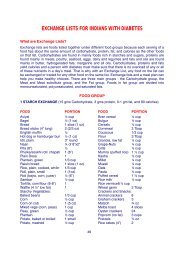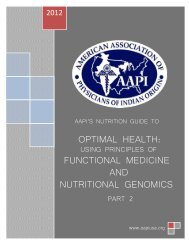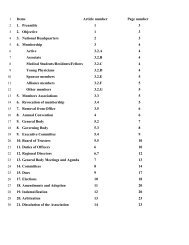functional medicine and nutritional genomics - American Association ...
functional medicine and nutritional genomics - American Association ...
functional medicine and nutritional genomics - American Association ...
Create successful ePaper yourself
Turn your PDF publications into a flip-book with our unique Google optimized e-Paper software.
AAPI’S NUTRITION GUIDE TO OPTIMAL HEALTH: USING PRINCIPLES OF FUNCTIONAL MEDICINE AND NUTRITIONAL GENOMICS<br />
<strong>and</strong> Roger Williams Ph.D. Dr. Pauling, Nobel Prize<br />
winner for Chemistry in 1954 <strong>and</strong> Peace in 1962,<br />
was already teaching about the importance of nutrients<br />
in modulating physiological processes at the<br />
biomolecular level. Roger Williams, Ph.D is credited<br />
with developing the concept of biochemical individuality<br />
<strong>and</strong> has been described as having ‚contributed to the<br />
evolution of the underst<strong>and</strong>ing of the molecular origin<br />
of disease‛ (1).<br />
The catalyst for the development of present-day<br />
<strong>nutritional</strong> <strong>genomics</strong> has been the Human Genome<br />
Project, a multinational undertaking that began in<br />
1990. While there were a number of goals, the<br />
primary goal was to identify the nucleotide sequence of<br />
the human DNA. However, the specific goals have<br />
changed over time since the Human Genome Project<br />
was completed in 2003, earlier than expected. Current<br />
research is focused on identifying the total number of<br />
genes, their chromosomal location, <strong>and</strong> their function<br />
(2).<br />
Why is this important to the dietitian? One reason<br />
may be because the impact of the Human Genome<br />
Project has created new information that is expected to<br />
alter the approach to risk assessment of <strong>nutritional</strong><br />
issues. However, the dietitian’s evolving role in the<br />
application of <strong>nutritional</strong> <strong>genomics</strong> to clinical practice<br />
will require a deepened underst<strong>and</strong>ing of <strong>genomics</strong>,<br />
gene-diet interactions <strong>and</strong> its applications to clinical<br />
nutrition practice to occur effectively (3).<br />
Fogg-Johnson <strong>and</strong> Kaput explain that some of the<br />
new information of the Human Genome Project is<br />
surfacing in areas that are not totally predictable.<br />
Through the Human Genome Project, it has been<br />
discovered that individual gene variations exist <strong>and</strong> are<br />
referred to as single nucleotide polymorphisms (SNPs,<br />
pronounced ‚snips‛). These SNPs result in differential<br />
response to environmental factors, such as diet. The<br />
science of how naturally occurring chemicals in foods<br />
alter expression of genetic information at the molecular<br />
level <strong>and</strong> how this effects the individual phenotype is<br />
the essence of what <strong>nutritional</strong> <strong>genomics</strong> scientists<br />
seek to uncover (4).<br />
As investigators learn how different individuals<br />
metabolize substances based on genetic uniqueness,<br />
there is an increasing awareness of the important roles<br />
specific nutrients can play in modifying the expression<br />
86<br />
2012<br />
of metabolic patterns in the individual. Diet, lifestyle,<br />
<strong>and</strong> environment have significant influence on the way<br />
an individual can metabolize specific substances based<br />
upon his or her genetic uniqueness. These discoveries<br />
have opened the door for the future of molecular<br />
<strong>medicine</strong> <strong>and</strong> the development of a personalized<br />
<strong>medicine</strong> that recognizes aspects of diet, lifestyle, <strong>and</strong><br />
environment <strong>and</strong> their roles in individual disease<br />
causation <strong>and</strong> the design of specific intervention<br />
programs.<br />
The takeaway from these concepts is that one size<br />
does not fit all. Diet <strong>and</strong> <strong>nutritional</strong> intervention must<br />
be personalized to the genetic characteristics of the<br />
individual. Gastrointestinal health is particularly<br />
important to achieving optimal nutrition <strong>and</strong> affords<br />
several examples of how diet <strong>and</strong> genes interface <strong>and</strong><br />
how the field of <strong>nutritional</strong> <strong>genomics</strong> can assist the<br />
registered dietitian (R.D.) in maximizing nutrition care<br />
interventions for the individual.<br />
The Healthy Gut<br />
The gastrointestinal (GI) tract is the second largest<br />
body surface area. The condition of this organ <strong>and</strong> the<br />
maintenance of its uniquely balanced microflora is<br />
essential to optimal health (5). The healthy intestinal<br />
wall is coated with hundreds of different species of<br />
microorganisms, both beneficial <strong>and</strong> pathogenic bacteria<br />
numbering in the trillions (5). This rich protective<br />
coating of microorganisms acts in concert with the<br />
physical barrier provided by the cells lining the<br />
intestinal tract <strong>and</strong> other factors to provide the body<br />
with important filter-like protection. So, in addition to<br />
digesting, absorbing <strong>and</strong> eliminating food substances<br />
<strong>and</strong> nutrients, the normal GI tract functions as a<br />
critical semi-permeable (selective) barrier between the<br />
internal <strong>and</strong> external environment. This prevents toxic,<br />
antigenic or pathogenic molecules or microorganisms<br />
from entering the bloodstream (6). Ultimately, the<br />
importance of the intestinal microflora <strong>and</strong>, more<br />
specifically, its composition, in physiological <strong>and</strong><br />
pathophysiological processes in the human GI is<br />
becoming more evident (6).<br />
Inflammatory Bowel Disease<br />
Inflammatory bowel disease (IBD) is a critical <strong>and</strong><br />
chronic disorder of the intestines. Generally, its<br />
complications can be severe, widespread <strong>and</strong> very

















